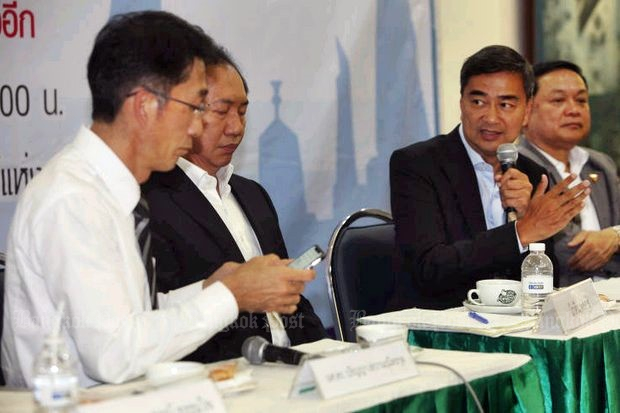
Three major parties agreed at a Monday forum that the House of Representatives should first try selecting the next prime minister before allowing the Senate to step in.
Five parties -- the Democrats, Pheu Thai, Bhumjaithai, Future Forward and Palang Pracharath -- were invited to the "How Not to Make Democracy Collapse Again" event in Bangkok.
However, Palang Pracharath (PPRP) and Bhumjaithai did not attend.
The Democrats, Pheu Thai and Future Forward parties shared the view that the Sunday poll must be honest and MPs should have first crack at voting for a prime minister before the regime-appointed Senate joins the selection process.
Democrat leader Abhisit Vejjajiva said doing it that way would reflect the people's wishes since MPs are directly elected.
Pokin Polakul, a key Pheu Thai figure, also insisted the Senate should leave the matter to the 500 MPs.
But if a pro-regime party, a reference to the PPRP, manages to form a minority government with the support of around 200 of the 500 MPs, some MPs from the majority bloc could be bought to vote for the prime ministerial candidate of the minority group's choice, he said.
Chamnan Chanrueng, a legal expert with the Future Forward Party, said MPs must vote overwhelmingly to stave off Prime Minister Prayut Chan-o-cha's prime ministerial candidacy in order to pressure the Senate not to endorse an unpopular choice.
The prime ministerial vote will be preceded by a vote in parliament to choose the parliamentary president. Normally, the highest position in the legislative branch is occupied by a person nominated by the party with the most MPs.
But this time around, that might not be the case as there is plenty of time for "negotiation" between the general election and the day the new parliament first convenes.
As it stands, a candidate would need at least half of the 750 members of both parliamentary chambers to become prime minister.
The Senate, with 250 members, is likely to be the deciding factor as even a candidate proposed by the second or third largest party could succeed with its support.
